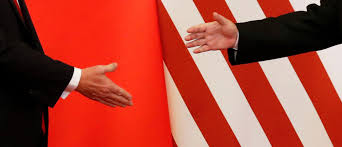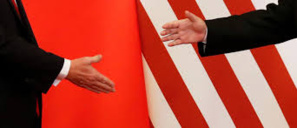Global financial markets were boosted with good news emerging from a trade deal meeting between the United States and China as top officials of both the countries reaffirmed their commitment to a Phase 1 trade deal despite Chinese procurement of American goods was slower than expected according to the deal.
But the two countries confirmed commitment to carry on with the partial trade agreement during a telephone call between US Trade Representative Robert Lighthizer, US Treasury Secretary Steven Mnuchin and Chinese Vice Premier Liu He. It was the first such formal meeting between the officials since early May even as there were concerns that the phase 1 trade agreement might get derailed because of the current geopolitical tensions between the two countries.
"Both sides see progress and are committed to taking the steps necessary to ensure the success of the agreement," the US Trade Representative's office (USTR) said in a statement after what it described as a regularly scheduled call.
This meeting was slated to be held on August 15 – six months into the signing of the partial trade agreement.
But that meeting with China was postponed by President Donald Trump and had said: "I don't want to deal with them now." Trump has also repeatedly expressed anger at China over the novel coronavirus pandemic and its imposing the controversial and sweeping national security law in Hong Kong by Beijing.
A growing list of disagreements including the new national security law imposed in Hong Kong, the military muscle flexing by China in the disputed territorial in the South China Sea, the deliberate suppressing of the news of the novel coronavirus and the US accusations of national security threats posed by Chinese tech firms has in recent months soured the relationship between Washington and Beijing.
The two sides had a "constructive dialogue", confirmed China's Commerce Ministry and added that the two sides had also agreed to continue following the efforts to implement the Phase 1 trade deal.
Some of the contentious issues that have been sticking points between the two countries including protection of intellectual property rights of American companies in China, allowing greater entry of American companies in the financial services industry and agriculture sectors of China and ending the policy of forced technology transfers were los discussed between the two countries in the telephonic meeting. The USTR said the two sides "addressed steps that China has taken to effectuate structural changes" on the above mentioned issues.
"The parties also discussed the significant increases in purchases of U.S. products by China as well as future actions needed to implement the agreement," the USTR said.
The positive news emerging from the meeting helped to prop up global stocks and Asian currencies.
"In pursuit of this extraordinarily weak trade deal that China is not even living up to, Donald Trump was outmaneuvered at every turn by Xi Jinping," said campaign spokesman of Joe Biden, Trump's opponent in the November 3 presidential election, Andrew Bates. "This is the most excruciatingly costly trade deal in American history."
The bilateral talks could lift demand for U.S. commodities "as Trump is desperate for good news to help in the election," said Ole Houe, director of advisory services at agriculture brokerage IKON Commodities in Sydney.
In the second half of the year, it is expected that China will import more American liquefied petroleum gas, propane and ethane to meet petrochemical feedstock shortages, but the growth in import of US crude by China will not be enough to meet the target set in the phase 1 trade agreement, said Yet Sushant Gupta, research director at the Wood Mackenzie consultancy.
(Source:www.usnews.com)
But the two countries confirmed commitment to carry on with the partial trade agreement during a telephone call between US Trade Representative Robert Lighthizer, US Treasury Secretary Steven Mnuchin and Chinese Vice Premier Liu He. It was the first such formal meeting between the officials since early May even as there were concerns that the phase 1 trade agreement might get derailed because of the current geopolitical tensions between the two countries.
"Both sides see progress and are committed to taking the steps necessary to ensure the success of the agreement," the US Trade Representative's office (USTR) said in a statement after what it described as a regularly scheduled call.
This meeting was slated to be held on August 15 – six months into the signing of the partial trade agreement.
But that meeting with China was postponed by President Donald Trump and had said: "I don't want to deal with them now." Trump has also repeatedly expressed anger at China over the novel coronavirus pandemic and its imposing the controversial and sweeping national security law in Hong Kong by Beijing.
A growing list of disagreements including the new national security law imposed in Hong Kong, the military muscle flexing by China in the disputed territorial in the South China Sea, the deliberate suppressing of the news of the novel coronavirus and the US accusations of national security threats posed by Chinese tech firms has in recent months soured the relationship between Washington and Beijing.
The two sides had a "constructive dialogue", confirmed China's Commerce Ministry and added that the two sides had also agreed to continue following the efforts to implement the Phase 1 trade deal.
Some of the contentious issues that have been sticking points between the two countries including protection of intellectual property rights of American companies in China, allowing greater entry of American companies in the financial services industry and agriculture sectors of China and ending the policy of forced technology transfers were los discussed between the two countries in the telephonic meeting. The USTR said the two sides "addressed steps that China has taken to effectuate structural changes" on the above mentioned issues.
"The parties also discussed the significant increases in purchases of U.S. products by China as well as future actions needed to implement the agreement," the USTR said.
The positive news emerging from the meeting helped to prop up global stocks and Asian currencies.
"In pursuit of this extraordinarily weak trade deal that China is not even living up to, Donald Trump was outmaneuvered at every turn by Xi Jinping," said campaign spokesman of Joe Biden, Trump's opponent in the November 3 presidential election, Andrew Bates. "This is the most excruciatingly costly trade deal in American history."
The bilateral talks could lift demand for U.S. commodities "as Trump is desperate for good news to help in the election," said Ole Houe, director of advisory services at agriculture brokerage IKON Commodities in Sydney.
In the second half of the year, it is expected that China will import more American liquefied petroleum gas, propane and ethane to meet petrochemical feedstock shortages, but the growth in import of US crude by China will not be enough to meet the target set in the phase 1 trade agreement, said Yet Sushant Gupta, research director at the Wood Mackenzie consultancy.
(Source:www.usnews.com)






